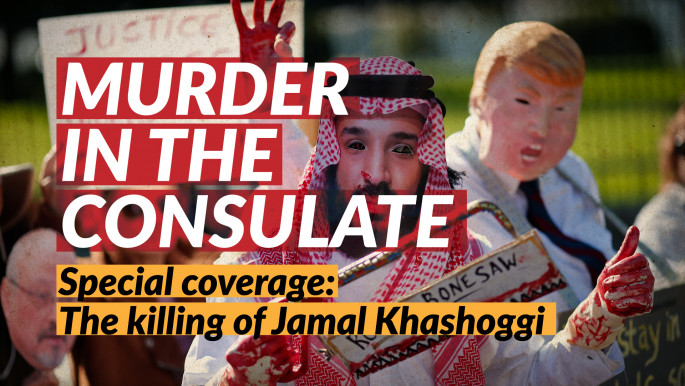
Defending Saudis on Khashoggi to take down Iran
It has revealed the American role in perpetuating the war crimes and humanitarian disaster in Yemen, and demonstrated how Saudi money influences Congress, DC think tanks, the US media, and even Donald Trump and his family.
These forces in recent weeks have worked hard to muddy the waters and deflect blame for Khashoggi's murder or to downplay its significance.
But one part of this Saudi support network has largely flown under the radar. Its primary focus isn't necessarily to promote Saudi Arabia and whitewash its autocracy or human rights abuses. Nor is there much love for Trump personally or any seeming motive to prop up his financial ties to Saudi Arabia. Instead, these DC operators are interested in maintaining the status quo with the Saudi monarchy for one purpose: confronting Iran.
A recent interview BBC World News conducted with Foundation for Defense of Democracies President Clifford May perfectly encapsulates how this wing of the pro-Saudi network has operated since Khashoggi's murder.
The argument that May unfolded during the BBC segment is almost formulaic. He tried to sow confusion about the details of the Khashoggi murder, questioned whether Crown Prince Mohammad bin Salman (MbS) was involved, raised fears about the consequences of holding MbS and the Saudi government responsible, and shifted the conversation to why the United States should continue business as usual with Saudi Arabia.
 |
The irony, is that Trump and other Iran hawks have routinely cited Iranian human rights violations as a reason to withdraw from the Iran nuclear deal |  |
So, for instance, May sought to discredit the sources of information about Khashoggi's murder. "It's also important to recognize that all the evidence that has come out so far has been from two sources," May said. "One is the Turkish government, Turkish really, intelligence, and the other is the Turkish media, neither I would call reliable sources."
Then, May attempted to absolve MbS: "Those who know him, say he is a very bright young man. This would not be a bright thing to do. It would be fairly self evidently damaging to him, his reputation, to Saudi Arabia and to Saudi Arabia's aims."
 |
|
| Read our special coverage: Murder in the Saudi consulate: Inside Jamal Khashoggi's killing |
May agrees the Khashoggi saga will have consequences for the US-Saudi relationship, but he then engages in a little fear-mongering by alluding to unwelcome internal power struggles to oust MbS from power.
"It is not in the US interest to see… instability in Saudi Arabia to the point where you have an ultra-Wahabi government or an ISIS government or something like that." May has obviously failed to notice that Saudi Arabia already has an ultra-Wahabi government.
Finally, he pivots to the main point: Iran "There's also the problem of Iran which seeks hegemony in the Middle East. And the US doesn't want that, the Saudis don't want that," May concludes, suggesting the two countries need to continue to work together to confront Iran. Ultimately, it doesn't matter what Saudi Arabia does, since it's a necessary ally in the fight to take down Iran.
This is largely why Trump and his top aides haven't done much by way of demanding Saudi accountability for the Khashoggi murder. Trump and his allies on Iran - May and the FDD, the Weekly Standard, and others - can't go all in on punishing Saudi Arabia and MbS for the murder of Khashoggi because they need Saudi Arabia for their economic war with Iran. With the Trump administration set to impose a new oil embargo on Iran next month, Saudi Arabia has to pick up the slack, in large part to avoid higher gas prices at home.
 |
It has revealed the American role in perpetuating the war crimes and humanitarian disaster in Yemen, and demonstrated how Saudi money influences Congress |  |
The irony, of course, is that Trump, FDD, and other Iran hawks have routinely cited Iranian human rights violations as a reason to withdraw from the Iran nuclear deal and ramp up pressure on Tehran.
"To what end the US is imposing economic pressure on Iran, and in the process letting Saudi Arabia get away with murder, is not obvious," Iran and non-proliferation expert Mark Fitzpatrick recently noted. "One need not squint too much between the lines of Trump administration pronouncements to read regime change as the hidden agenda."
Iran hawks are quite sensitive when this agenda is exposed. Indeed, this week, FDD tweeted May's quote about the Turks being unreliable sources of information on Khashoggi. But after being called out for seemingly running interference for Saudi Arabia to get its war with Iran, FDD promptly deleted the tweet.
Ben Armbruster is the communications director for Win Without War and previously served as national security editor at ThinkProgress.
Follow him on Twitter: @benjaminja
This article was originally published by our friends at Lobelog.
Opinions expressed in this article remain those of the author and do not necessarily represent those of The New Arab, its editorial board or staff.





 Follow the Middle East's top stories in English at The New Arab on Google News
Follow the Middle East's top stories in English at The New Arab on Google News


